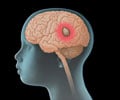A cancer-related protein Ezh2 ‘histone writer’ that is responsible for suppressing the brain tumor may also drive aggressive form of brain tumor called medulloblastoma.
Highlights
- Medulloblastoma is a malignant tumor that begins in the region of the brain.
- Ezh2 ‘histone writer’ is a protein that is capable of suppressing cancer.
- Drugs that are developed by targeting the Ezh2 protein for brain tumor must be cautioned, to prevent an aggressive form of medulloblastoma.
Ezh2 is a histone writer enzyme that is capable of tagging or labeling other proteins in a way that it would turn off genes. The protein was found to suppress cancer. The drug has potential use of inhibition and some of them are even tested in clinical trials.
In short, Ezh2 is the histone H3K27 mono-, di and trimethylase of polycomb repressive complex-2. The enzyme is found to add methyl groups to specific histone proteins, that are capable of leading to modification which can affect gene expression.
The research team used CRISPR gene editing to study the protein activity in a mouse model. The loss of function in the protein due to gene editing may also result in the acceleration of the development of aggressive medulloblastoma tumors.
Martine Roussel, Ph.D., a member of the Department of Tumor Cell Biology at St. Jude Children’s Research Hospital, said, "We expected Ezh2 to be an oncogene in this aggressive tumor, but our gene-editing work revealed it to be a tumor suppressor." "Clearly this poses questions about the use of inhibitors to target this protein in a way that stops the progress of this aggressive form of medulloblastoma."
The research study has revealed that several proteins are being involved in the development of medulloblastoma tumors, which include
- Onco-gene Myc
- Histone writer Ezh2 and another protein Gfi1
The research team also implicated Gfi1 by inactivating the Ezh2 in group 3 medulloblastoma. The cancer was enhanced when Ezh2 was declined and Gfi1 increased.
"The new study further substantiates the tumorigenic role of Gfi1 in medulloblastoma, and reveals that this oncogene is normally repressed by Ezh2. The loss of this regulation by Ezh2 ’releases the brakes’ on Gfi1 and leads to uncontrolled cell growth. The findings in the current study help refine our knowledge of some of the important molecular mechanisms involved in Group 3 medulloblastoma and will be useful for probing therapeutic potential."
There were also other studies that revealed Ezh2 to be linked with a wide range of aggressive and advanced forms of cancer. Proteins are found to be an attractive target for drugs as they are considered to be a molecular switch for cancers.
The researchers also succeeded in developing potent inhibitors of the protein that may halt cancer in early preclinical and phase I/II studies.
The research findings also suggested that inhibiting the Ezh2 protein could be counterproductive for cancer treatment in certain situations. Scientists also found that Ezh2 may behave in different ways depending on the type of cancer. It will also tease out the details of how the proteins may develop medulloblastoma tumors.
Roussel said, "The model system we have developed will be extremely useful to reveal the mechanisms that cause this cancer to progress and to study the different options for potential therapeutic interventions before proceeding to more advanced preclinical studies."
Medulloblastoma
It is a cancerous tumor which begins in the region of the brain, at the base of the skull called posterior fossa.
Medulloblastoma tumors may spread to the brain and spinal cord. It is more common among boys when compared to girls and is usually diagnosed before the age of 16. 20% of all childhood brain tumors accounts for medulloblastoma.
Symptoms include
- Problems with handwriting
- Headache
- Nausea and vomiting
- Vision problems
- BaoHan T. Vo, Chunliang Li, Marc A. Morgan, Ilan Theurillat, David Finkelstein, Shaela Wright, Judith Hyle, Stephanie M.C. Smith, Yiping Fan, Yong-Dong Wang, Gang Wu, Brent A. Orr, Paul A. Northcott, Ali Shilatifard, Charles J. Sherr, Martine F. Roussel. Inactivation of Ezh2 Upregulates Gfi1 and Drives Aggressive Myc-Driven Group 3 Medulloblastoma. Cell Reports, 2017; 18 (12): 2907 DOI: 10.1016/j.celrep.2017.02.073
- Medulloblastoma Facts - (https://www.mdanderson.org/cancer-types/medulloblastoma/medulloblastoma-facts.html)
- What is medulloblastoma? - ( https://www.stjude.org/disease/medulloblastoma.html)
Source-Medindia
















